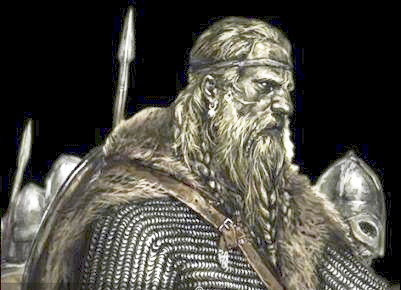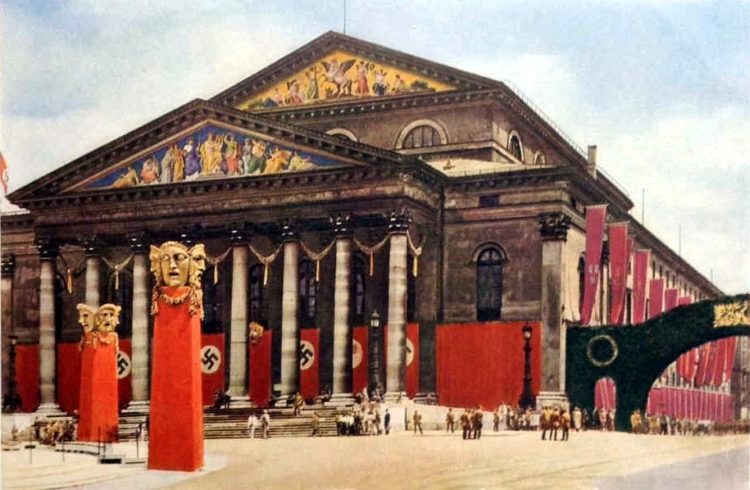by Kevin Alfred Strom
This week we continue our exploration of the evolution of religion and religious thought in National Socialist Germany. With profounder ideals and a stronger will than any other leadership structure of any other society for thousands of years at least, Germany ultimately sought to spiritually shepherd the unique expression of the Life Force and the growing consciousness that is our race through the dangers of the 20th century and beyond. Those dangers include 1) being trapped in an earth-bound Semitic creed designed to ensnare us in universalism, weakness, and worship of our enemies; 2) rejecting that Semitic creed in favor of an atheistic materialism and individualism that destroys our ability to grow and act as a natural biological and spiritual community; and 3) rejecting that Semitic creed in favor of the equally alien, spiritually empty, and equally debilitating equalitarian creed of Marxism.
We’ll be hearing of this spiritual evolution in the words of National Socialist writer Savitri Devi, from her “National Socialism and Neo-Paganism,” an excerpt from her book Gold in the Furnace, most of which was written while she was imprisoned for her ideas in postwar Germany.
Munich theatre decorated for a “Day of German Art and Music” celebration during the National Socialist period: Can anyone
doubt that a new spirituality was being developed here?
National Socialism and Neo-Paganism, part 2
by Savitri Devi
The same inspiration—the same quest of the eternal Aryan faith under its present-day Germanic form—fills Johann von Leers’ History on a Racial Basis which I mentioned. There too one finds, applied to the domain of religion and culture, that passionate assertion of the rights of the Aryan North which constitutes, perhaps, the most characteristic feature of National Socialism on the political plane. For a political awakening of the type that Adolf Hitler provoked, stirring a whole nation to its depth, cannot go without a parallel awakening in allfields of life, especially in that of culture and religion—of thought, generally speaking. There too, one finds—based this time upon the extensive researches of Hermann Wirth in ancient lore—a protest against the idea, current in all the Judeo-Christian world, that the old Aryan North was something “primitive” and “barbarous”; and a vision of the future in which Germany in particular and the Aryan race at large will rise again to unprecedented greatness, having re-discovered their glorious, eternal collective Self. The passage of Johann von Leers’ book which comes a few pages after his tribute to Hitler as “the greatest regenerator of the people for thousands of years” is worth quoting in extenso:
After a period of decadence and race-obliteration we are now coming to a period of purification and development which will decide a new epoch in the history of the world. If we look back on the thousands of years behind us, we find that we have arrived again near the great and eternal order experienced by our forefathers. World history does not go forward in a straight line, but moves in curves. From the summit of the original Nordic culture in the Stone Age, we have passed through the deep valleys of centuries of decadence, only to rise once more to a new height. This height will not be lesser than the one once abandoned, but greater, and that, not only in the external goods of life…. We did not pass through the great spiritual death of the capitalistic period in order to be extinguished. We suffered it in order to rise again under the Sign that never yet failed us, the Cross of the great Stone Age, the ancient and most sacred Swastika.
The form and particulars of a modern Aryan religion destined to rule consciences in the place of obsolete Christianity are not yet laid out—and how could they be? But the necessity of such a religion could not be more strongly felt and expressed; and its spirit and main features are already defined. It is the healthy religion of joy and power—and beauty—which I have tried to suggest in the beginning of this book. In other words, it is the eternal aspect of National Socialism itself or (which means the same) National Socialism extended to the highest sphere of life.
I have previously recalled the Führer’s words of wisdom concerning the growth of a new religion, better adapted than Christianity to the requirements of the people, namely, that “until such a new faith does appear, only fools and criminals will hurry to destroy what is there, on the spot.”
In 1924—when he wrote Mein Kampf—he obviously felt that the time was not yet ripe for such a revolution.
From what one reads in the famous Goebbels Diaries, published by our enemies in 1948 (and therefore, no one knows to what extent genuine) he would appear to have been in perfect agreement with the Reich Propaganda Minister’s radical opposition to the Churches at the same time as with his cautious handling of the religious question during the war. As long as the war was on, it was, no doubt, not the time to promote such changes as would, perhaps, make many people realise too abruptly that they were fighting for the establishment of something which, maybe, they did not want. But, when victory would be won, then, many things that looked impossible would be made possible. According to the Diaries, the Führer was even planning, “after the war,” to encourage his people, gradually, to alter their diet, with a view to doing away with the standing horror of the slaughter-houses—one of the most laudable projects ever seriously considered in the history of the West, which, if realised, would have at once put Germany far ahead of all other nations, raising her conception of morality much above the standard reached by Christian civilisation[reddish emphasis by C.T.].
He was certainly also planning the gradual formation of a religious outlook worthy of the New Order that he was bringing into being. Already, the most devotedly radical among the active Party members, the corps d’Élite; the SS men—were expected to find in the National Socialist Weltanschauung alone all the elements of their inner life, without having anything to do with the Christian Churches and their philosophy. And if one recalls, not the Führer’s public statements, but some of the most striking private statements attributed to him, one feels convinced that he was aware of the inadequacy of Christianity as the religion of a healthy, self-confident, proud, and masterful people no less than any of the boldest of the National Socialist thinkers, nay, no less than Heinrich Himmler himself and those whom he had in mind when he repeatedly wrote, in his brilliant booklet, Wir Heiden—“We Heathens.”
I know that the sayings attributed to a man, either by an admiring devotee in a spirit of praise or by an enemy, in a spirit of hatred, are, more often than not, of doubtful authenticity. Yet, when, while quoted in order to praise the one alleged to have uttered them, they in reality condemn him, or when, while quoted as “awful” utterances, with the intention of harming him, they in reality constitute praise; and when, moreover, they happen to be too beautiful, or too true, or too intelligent for the reporter to have invented them wholesale, then one can, I believe, accept them as authentic or most probably so.
Of the many books written purposely to throw discredit upon our Führer, I have only read one through and through; but that one—the work of the traitor Rauschning, translated into English under the title Hitler Speaks—I read not merely with interest, but with elation, for it is (much against the intention of its author) one of the finest tributes paid to the Saviour of the Aryan race. Had I come from some out-of-the-way jungle and had I never even heard of the Führer before, that book alone would have made me his follower—his disciple—without the slightest reservation. Should I characterise the author of such excellent propaganda as a scoundrel?
Or is he not just a perfect fool: a fellow who joined the National Socialist Movement when he had no business to do so, and who recoiled in fright as soon as he began to realise how fundamentally opposed his aspirations were to ours? His aspirations were, apparently, those of a mediocre “bourgeois.” After he turned against us, he did not actually lie; he did not need to. He picked out, in the Führer’s statements, those that shocked him the most—and that were likely to shock also people who resemble him. And he wrote Hitler Speaks, for the consumption of all the mediocre “bourgeois” of the world. As there are millions of them, and as the world they represent was soon to wage war on the Führer, the book was a commercial success at the same time as an “ideological” one—the sort of success the author had wanted: it stirred the indignation of all manner of “decent” Untermenschen against National Socialism.
But one day (if it survives) a regenerate Aryandom will look upon it as the unwilling tribute of an enemy to the greatest European of all ages.
And Hitler’s words about Christianity, reported by Rauschning in the fourth chapter of his book, would be admired—not criticised—in an Aryan world endowed with a consistently National Socialist consciousness, for they are in keeping with our spirit—and ring too true not to be authentic. “Leave the hair-splitting to others,” said the Führer to Hermann Rauschning before the latter turned renegade:
Whether it is the Old Testament or the New, or simply the sayings of Jesus according to Houston Stewart Chamberlain, it is all the same Jewish swindle. It will not make us free. A German Church, a German Christianity, is a distortion. One is either a German or a Christian. You cannot be both. You can throw the epileptic Paul out of Christianity—others have done so before us. You can make Christ into a noble human being, and deny his divinity and his rôle as a saviour. People have been doing it for centuries. I believe there are such Christians today in England and America—Unitarians, they call themselves, or something like that. It is no use. You cannot get rid of the mentality behind it. We do not want people to keep one eye on life in the hereafter. We need free men, who feel and know that God is in themselves.
Indeed, however clever he might have been, Rauschning was not the man to concoct this discourse out of pure imagination. As many other statements attributed to the Führer in his book, this one bears too strongly the stamp of sincerity, of faith—of truth—to be just an invention.
Moreover, it fits in perfectly with many of the Führer’s known utterances, with his writings, with the spirit of his whole doctrine which is, as I said before, far more than a mere socio-political ideology. For, whatever might be said, or written, for the sake of temporary expediency, the truth remains that National Socialism and Christianity, if both carried to their logical conclusions—that is to say, experienced in full earnest; lived—cannot possibly go together.
The Führer certainly thought it premature to take up, publicly, towards the Christian doctrine as well as the Churches, the attitude that the natural intolerance of our Weltanschauung would have demanded; but he knew that we can only win, in the long run, if, wherever essentials are concerned, we maintain that intolerance of any movement sincerely “convinced that it alone is right.” And he knew that, sooner or later, our conflict with the existing order is bound to break out on the religious and philosophical plane as well as on the others.
This is unavoidable. And it has only been postponed by the material defeat of Germany—perhaps (who knows?) in accordance with the mysterious will of the Gods, so as to enable the time to ripen and the Aryan people at large, and especially the Germans, to realise, at last, how little Christianity can fulfil their deeper aspirations, and how foolish they would be to allow it to stand between them and the undying Aryan faith implied in National Socialism.
That Aryan faith—that worship of health, of strength, of sunshine, and of manly virtues; that cult of race and soil—is the Nordic expression of the universal Religion of Life. It is—I hope—the future religion of Europe and of a part at least of Asia (and, naturally, of all other lands where the Aryan dominates). One day, those millions will remember the Man who, first—in the 1920s—gave Germany the divine impetus destined to bring about that unparalleled resurrection; the Man whom now the ungrateful world hates and slanders: our Hitler.
Imprisoned here for the love of him, my greatest joy lies in the glorious hope that those reborn Aryans—those perfect men and women of the future Golden Age—will, one day, render him divine honours.
___________
Editor’s note: For the footnotes and an audio accompanying this text, see the original article: here.








